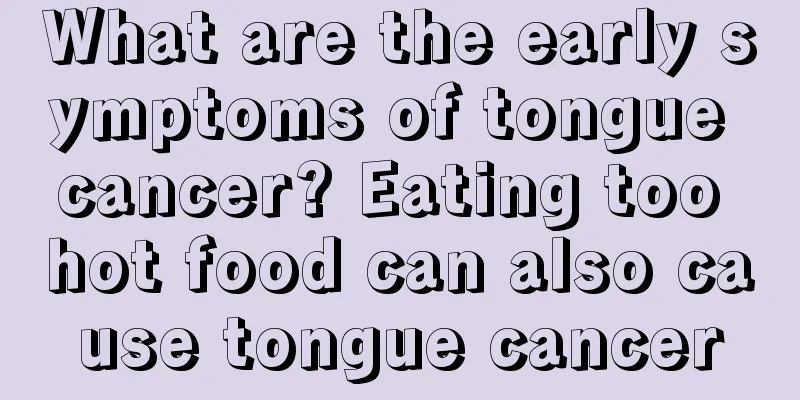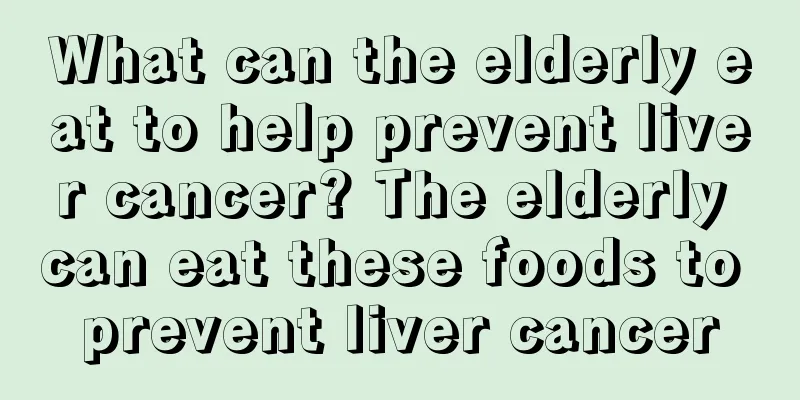What are the early symptoms of tongue cancer? Eating too hot food can also cause tongue cancer

|
Although tongue cancer is not as well known as lung cancer and stomach cancer, it is not uncommon. Among oral malignancies, tongue cancer, gingival cancer, and cheek cancer are the top three. How dangerous is tongue cancer? The malignancy of tongue cancer depends on the type, size, and location. Most tongue cancers are squamous cell carcinomas. Adenocarcinomas are less common, but more dangerous. Of course, this also depends on whether cell differentiation occurs. The larger the tumor and the closer it is to the root of the tongue, the more dangerous it is. Because more parts are removed during surgery, the impact on tongue function is greater, and tongue reconstruction is required. If the mandible and pharynx are affected, it will be even more troublesome. What are the early symptoms of tongue cancer? Tongue cancer is prone to occur in the peripheral part of the tongue. In the early stage, there is only a small painless lump. If you have a certain degree of vigilance, this small lump is easy to find. Many people do not care about the small lump on the edge of the tongue. They will not see a doctor until the small lump grows larger, protrudes from the surface of the tongue, or has formed a surface ulcer. If it is tongue cancer, it is already in the middle or late stage. When ulcers appear in tongue cancer, the edge of the ulcer can be seen to be raised, the bottom surface is uneven, and it is easy to bleed. The ulcer will not heal for a long time and is prone to secondary bacterial infection. The patient has unbearable pain due to the tongue ulcer, and it is difficult to eat and speak, and there is a special stench in the mouth. These symptoms of tongue cancer should be taken seriously Tongue cancer usually occurs at the edge of the tongue, followed by the tip, back and root of the tongue. Tongue cancer has the following clinical manifestations: 1. Lump Initial symptoms include plaques and nodules of local tissue thickening, local erosion, and fissures on the tongue mucosa. The lesion progresses rapidly, affecting the tongue muscles, forming nodules and lumps. Ulcers with slightly raised edges may appear in the center of the mass. 2. Pain In the early stage of the disease, there is slight local pain or no conscious symptoms, and local stimulation pain occurs when eating. As the disease progresses, severe pain may occur, radiating to the ipsilateral head and face, and the pain may worsen when eating, talking, or swallowing. 3. Dysfunction There is no obvious functional impairment in the early stage of the lesion. As the tumor grows and ulcerates, bad breath, drooling, tongue movement disorder, and limited opening of the mouth will occur, affecting oral functions such as speaking, eating, and swallowing. 4. Transfer Tongue cancer often metastasizes to the cervical lymph nodes at an early stage, and the metastasis rate is high. It manifests as a neck lump, which is movable and painless at the beginning, but becomes fixed and painful as it progresses, adheres to the skin, and causes skin ulceration, exudation, and bleeding. 5. Cachexia The toxic substances produced by the rapid growth and destruction of the tumor cause metabolic disorders, and the body is constantly consumed by bleeding, pain, hunger, etc. Patients with advanced tongue cancer experience symptoms such as anemia, weight loss, fever, and body failure, which is called "cachexia." Eating too hot food can also cause tongue cancer In addition to "bad teeth" and stimulation from smoking and drinking, eating hot food is also a cause of the high incidence of oral cancers such as tongue cancer. Studies have found that the maximum temperature that the oral cavity can tolerate is 50-60°C, but when it just feels very hot, the temperature is mostly around 70°C, at which time the oral mucosa will have mild burns. If you burn your mouth frequently, it will easily lead to aggravation of oral mucosal ulceration, making it more difficult to heal the ulcer. If the cells in the ulcer proliferate and divide too quickly, the chance of the newly generated cells becoming cancerous will increase. Therefore, people who like to eat spicy hot pot should pay attention to cooling down before eating. |
<<: What is the best thing to eat after renal hamartoma surgery
Recommend
What to eat for chemotherapy of nasopharyngeal carcinoma and how to regulate life
What should nasopharyngeal cancer patients eat du...
What causes sudden heart pain?
If we suddenly feel a pain in our heart in our li...
Basic skills for girls to learn street dance
Street dance is the most popular type of dance am...
Which one has greater radiation, CT or X-ray
The human body is composed of many organs and tis...
Is it easy to get poisoned if you eat eggs and brown sugar together?
There will be no poisoning if you eat eggs and br...
Is the cure rate of malignant anterior mediastinal teratoma high?
Does malignant anterior mediastinal teratoma have...
Can traditional Chinese medicine hospitals cure colorectal cancer?
What are the TCM treatments for colorectal cancer...
What are the symptoms of hormone-dependent dermatitis?
Glucocorticoid-dependent dermatitis is a particul...
The difference between age spots and skin cancer
Many people don’t understand the difference betwe...
What are the pros and cons of minimally invasive surgery for liver cancer? These need to be noted
Nowadays, there are more and more patients suffer...
Are there any side effects of drinking Panax notoginseng powder regularly?
In our lives, many people often drink some Panax ...
What are the methods of dietary treatment for chronic pharyngitis
Most patients with chronic pharyngitis will choos...
An inconspicuous part of the body is most likely to get cancer
Most vulnerable part to cancer 1: Lung Lung cance...
How to remove small pimples on the neck, pay attention to the method
Nowadays, people, especially women, are more and ...
How to remove the hair in the buttock groove
For normal people, when they enter puberty, pubic...









